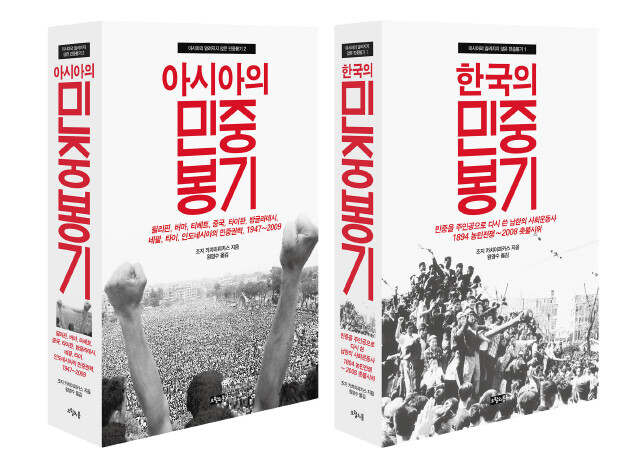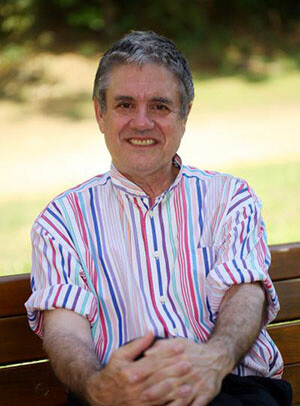hankyoreh
Links to other country sites 다른 나라 사이트 링크
US professor chronicles Asia’s unknown uprisings

A US professor and renowned May 18 scholar recently published two Korean translations of books on popular uprisings in ten Asian countries, including South Korea.
Wentworth University of Technology professor George Katsiaficas will visit the Gwangju International Center on May 14 for an event to celebrate the publication of “Popular Uprisings in Korea” and "Popular Uprisings in Asia.”
The two books, each around 650 pages long, present a chronicle of major uprisings in ten Asian countries. Korean translations of Katsiaficas’s two-volume, 1,000-page-long 2012 book “Asia’s Unknown Uprisings,” their release comes on the eve of the 35th anniversary of the Gwangju Democratization Movement on May 18.

For the book, Katsiaficas began visiting the sites of popular uprisings in different Asian countries and hearing eyewitness accounts in 2000. The text presents the events of the uprisings from the perspective of their citizen participants. In contrast with other works of history, it provides a bird’s-eye-view of the experiences of countless people as heard first hand.
The idea for the book was inspired by a 2000 meeting in Gwangju with the East Timorese bishop Carlos Filipe Ximenes Belo, who lamented the lack of scholarly research on Asian democracy movements and urged Katsiaficas to take an interest.
Subtitled “A History of 20th Century Social Movements Retold with the People as the Heroes,” the South Korea volume of “Asia‘s Unknown Uprisings” relates a grim history of struggle spanning more than a century between the Joseon-era Donghak Peasant Revolution in 1894 and the candlelight protests against US beef imports in 2008. It also dedicates considerable space to the “power of love” and nascent anti-American sentiment witnessed with the 1980 events in Gwangju, which he writes “has a meaning in Korean history that can only be compared to that of the Paris Commune in French history and of the battleship Potemkin in Russian history.”
Applying the “eros effect” as an framework for analyzing social movements, Katsiaficas writes of the Gwangju Democratization Movement as an example in which a large number of citizens attempted to establish the “authority of love” according to transformed norms and values.
“Modern Koreans have lived in a whirlwind of happiness and sorrow, of prosperity and poverty, of progressive political movements and reactionary dictatorships,” he writes.
“Korea’s internal communications networks and civil society are extraordinarily well developed, a significant resource in the country’s long history of struggle for freedom,” he adds, noting that the struggle made the world a more “humane and participatory place.”
The Asia volume includes examples of popular uprisings in nine countries, including China, Tibet, Nepal, and Indonesia, between 1948 (the year of the “Feb. 28 Incident” in Taiwan) and 2009 (a year of political protests in Thailand). One area of particular focus is the democracy wave that spread rapidly over the 12 years between the 1986 People Power movement in the Philippines and 1998 student protests in Indonesia.
“Western media frequently either ignore incidents in Asia or use them selectively to justify their regimes,” Katsiaficas writes.
“My hope is that this book contributes to breaking the chains of exaggerated falsehood and intentional omission that have bound us.”
Katsiaficas formed his own ties with Gwangju working for three years as a guest professor at Chonnam National University’s May 18 Institute between 2001 and 2004 and conducting interviews with some 100 protest participants. His findings have been used as part of a research project on the events of the armed uprising in 1980, a subject he has published a number of papers and books on in the US and the United Kingdom.
Katsiaficas earned a “Mothers of May” award for his achievements in 2010, and is scheduled to receive honorary citizenship from the city of Gwangju on May 21.
By Ahn Gwan-ok, Gwangju correspondent
Please direct questions or comments to [english@hani.co.kr]

Editorial・opinion
![[Guest essay] The real reason Korea’s new right wants to dub Rhee a founding father [Guest essay] The real reason Korea’s new right wants to dub Rhee a founding father](https://flexible.img.hani.co.kr/flexible/normal/500/300/imgdb/original/2024/0423/8317138574257878.jpg) [Guest essay] The real reason Korea’s new right wants to dub Rhee a founding father
[Guest essay] The real reason Korea’s new right wants to dub Rhee a founding father![[Column] ‘Choson’: Is it time we start referring to N. Korea in its own terms? [Column] ‘Choson’: Is it time we start referring to N. Korea in its own terms?](https://flexible.img.hani.co.kr/flexible/normal/500/300/imgdb/original/2024/0423/3617138579390322.jpg) [Column] ‘Choson’: Is it time we start referring to N. Korea in its own terms?
[Column] ‘Choson’: Is it time we start referring to N. Korea in its own terms?- [Editorial] Japan’s rewriting of history with Korea has gone too far
- [Column] The president’s questionable capacity for dialogue
- [Column] Are chaebol firms just pizza pies for families to divvy up as they please?
- [Column] Has Korea, too, crossed the Rubicon on China?
- [Correspondent’s column] In Japan’s alliance with US, echoes of its past alliances with UK
- [Editorial] Does Yoon think the Korean public is wrong?
- [Editorial] As it bolsters its alliance with US, Japan must be accountable for past
- [Guest essay] Amending the Constitution is Yoon’s key to leaving office in public’s good graces
Most viewed articles
- 1[Column] ‘Choson’: Is it time we start referring to N. Korea in its own terms?
- 2Opposition calls Yoon’s chief of staff appointment a ‘slap in the face’
- 3[Guest essay] The real reason Korea’s new right wants to dub Rhee a founding father
- 4Senior doctors cut hours, prepare to resign as government refuses to scrap medical reform plan
- 5Why Korea shouldn’t welcome Japan’s newly beefed up defense cooperation with US
- 6New AI-based translation tools make their way into everyday life in Korea
- 7[Editorial] Japan’s rewriting of history with Korea has gone too far
- 8Terry Anderson, AP reporter who informed world of massacre in Gwangju, dies at 76
- 9[Column] Has Korea, too, crossed the Rubicon on China?
- 10[Column] The clock is ticking for Korea’s first lady